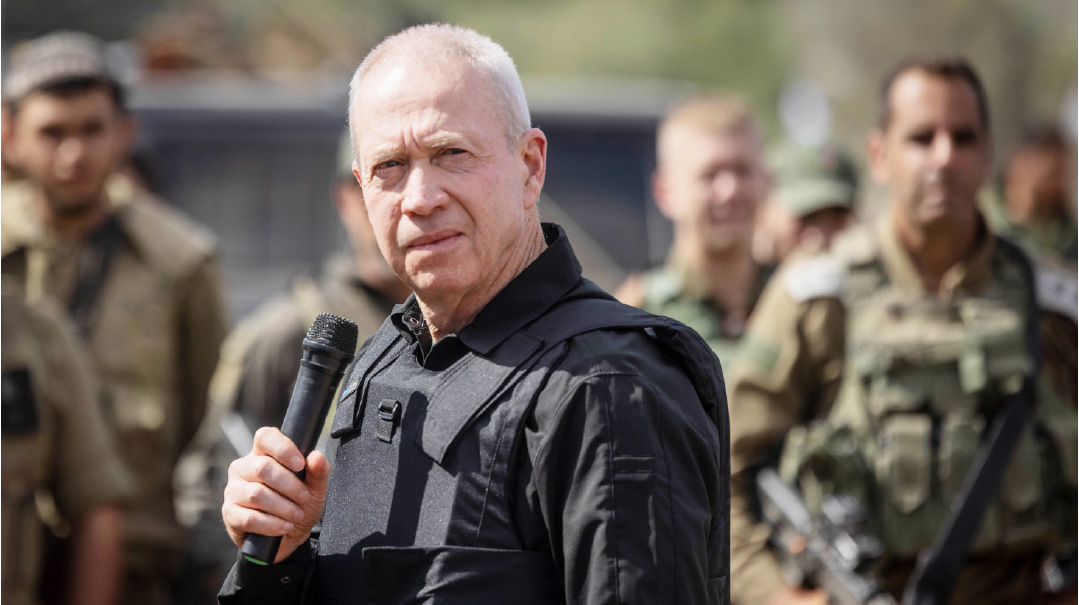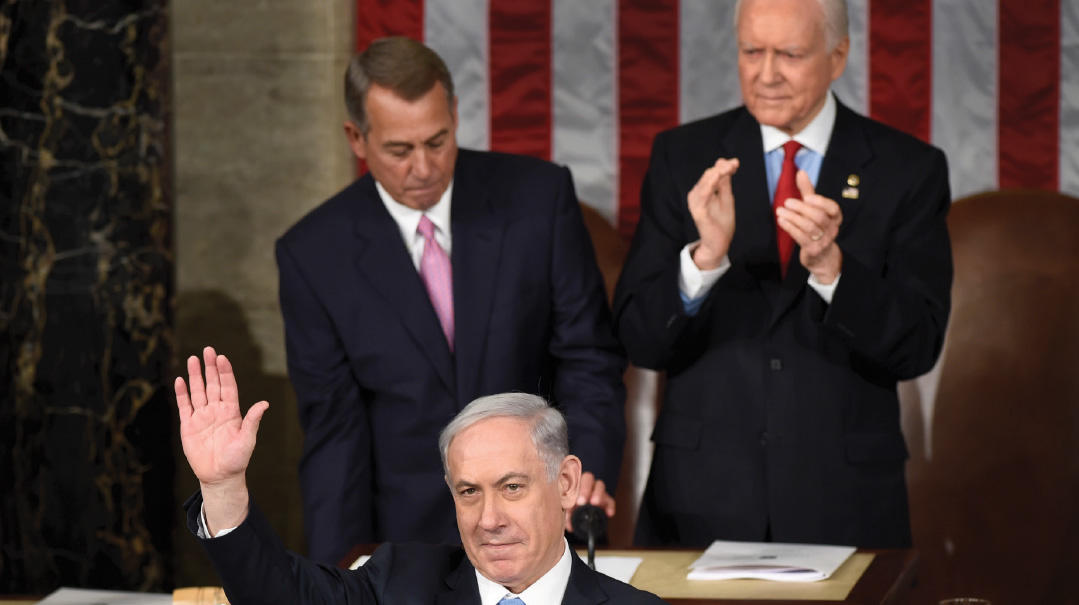It Could Have Been Worse

After months of Israeli strikes, Hezbollah are far from deterred

Yoav Gallant, cabinet hawk (Photo: Flash90)
1
IT could have been worse — and in Israel these days, that’s good news. The International Court of Justice’s decision not to issue an injunction to end the fighting and allow Gazans back into the northern Gaza Strip came as a kind of relief for Israel’s political echelon.
Israel can live with the meaningless interim measures the court did adopt, as well as its tone, casting Israel as the aggressor — as long as the IDF tank columns continue to roll through Gaza.
Meanwhile, on the ground, the fighting continues with real achievements but heavy costs. Every time an evening newscast reports on “fierce fighting” in Gaza, it comes as a dreaded harbinger for the next morning’s broadcast to open with the chilling words, “The IDF has approved the announcement” — of names of soldiers who have fallen.
American military advisors’ grim projection of four to twenty fatalities a day hit the war cabinet’s desk even before the start of the current war.
In 2014, a memorandum by then–IDF chief of staff Benny Gantz, now a member of the war cabinet, estimated the cost of reconquering the Gaza Strip at 500 fatalities. In the decade since, thousands more tons of cement and ammunition poured into Gaza to fortify Hamas’s tunnels, and the bleak forecast had to be revised accordingly. Even the comparison to the US military’s struggles in Mosul only downplays the IDF’s challenges in the Gaza Strip, where every Hamas outpost has to be conquered twice, above ground and below it.
When Biden dispatched senior US Special Forces officers who oversaw the recapture of Mosul to Israel at the start of the war, he was sending a message with two layers. One, as commander-in-chief of the US military, which has fought the world’s toughest guerilla warfare over the past few decades. Two, as a US president trying to warn Israel’s war cabinet of the cost of a ground invasion of Gaza, and encouraging it to reconsider.
“This government has no siyata d’Shmaya,” war cabinet member Aryeh Deri told me with a sigh at the time.
The price has been painful, and every life lost is a universe of its own. But the truth is that even after 115 days of combat, the actual toll is significantly lower than projected. If there’s anything the people of Israel need these days, it’s some kind of smile from Above.
2
With Israel and Qatar at an impasse over a hostage deal, all eyes are on Washington. “What the US is actually proposing is a sort of cease-fire involving recognition of a revitalized Palestinian Authority that includes Hamas, and that’s something we can’t accept,” a moderate war cabinet member told me last week.
In conversations with Defense Ministry officials, one gets the sense that the disagreements between the current war cabinet members Gantz, Eisenkot, and Netanyahu pertain to style rather than substance.
Israel’s proposal for a two-month cease-fire in exchange for the staggered release of the remaining hostages was accepted by all cabinet members and rejected by Hamas. Even if a much-further-reaching proposal comes from the other side, everyone on the Israeli side would accept it, as long as it stops short of an actual commitment to end the fighting for good.
Bibi also differs from his centrist coalition partners in his attitude toward the Hostages and Missing Families Forum, some of whose most prominent activists openly launched a campaign for Netanyahu’s ouster last week. The involvement of the “Kaplan brigade,” who led the protests against the judicial reform, has led the right wing to view the “Bring Them Home Now” movement as a direct continuation of the previous struggle to topple the government. The impression one gets is “same person, different clothes.”
This is the place to emphasize that my criticism is not directed at the families of the abductees — who have every right to seek the welfare of their loved ones —but at those who appear to have hijacked their struggle for political purposes.
3
Defense Minister Yoav Gallant sees the takeover of Khan Yunis in southern Gaza as a correction of the historic wrong of Operation Cast Lead in January 2009, Israel’s most powerful military operation in Gaza between Hamas’s 2007 takeover of the Strip and the current war, Operation Iron Swords.
As head of the Southern Command at the time, Gallant presented the war cabinet, comprised of Prime Minister Ehud Olmert, Defense Minister Ehud Barak, and Foreign Minister Tzipi Livni, with an operational plan for dismantling Hamas’s military capabilities. Then in his political twilight, Olmert supported the move, but Barak and Livni demurred, leaving Gallant with a keen sense of an opportunity missed.
Rivers of bad blood have flowed between Prime Minister Netanyahu and Defense Minister Gallant, who find it difficult to look each other in the eye, but one thing is unquestionable: Since October 8, Gallant has stood out as this war’s biggest hawk, always supporting the most forceful move, while his colleagues dither and hesitate.
This is true for IDF operations in the Gaza Strip, but even more so for the northern front. Time (perhaps only a few days) will tell whether it would have been wiser to accept the IDF’s proposal, strongly backed by Gallant, to deliver a powerful preemptive blow to Hezbollah at the start of the war. Gallant was alone in supporting it, against Netanyahu, Gantz, and Eisenkot.
The Biden administration, which stood by Israel at those lowest moments, exerted all its considerable weight to prevent Netanyahu from opening a second front and escalating the conflict into a regional war. The American position on the matter still stands, and in the last phone call between Netanyahu and Biden, their biggest disagreement centered not on Gaza but on Lebanon.
January 31, 2024, is Israel’s deadline to America to arrive at a settlement that would distance Hezbollah from the border. American diplomat Amos Hochstein, who has Biden’s full confidence, and President Emmanuel Macron of France, a country with longstanding interests in Lebanon, are working night and day to achieve a diplomatic solution.
“I give the diplomatic process a slim chance,” one cabinet member told me — although that’s perhaps better understood as a threat to Hezbollah than an honest appraisal.
The northern front will likely impact the duration of Gantz and Eisenkot’s stay in the coalition, as well. Currently, the only thing standing between them and resignation is the security situation in the north. If a high-intensity conflict erupts there, the pair can’t afford to be seen as having turned their backs.
But if a diplomatic resolution to the northern standoff is achieved, the prevailing wisdom is that as far as Gantz and Eisenkot are concerned, the countdown will have already started.
(Originally featured in Mishpacha, Issue 997)
Oops! We could not locate your form.







